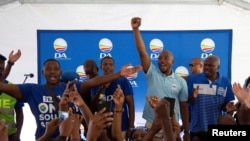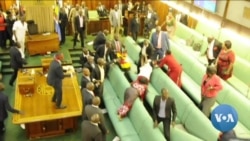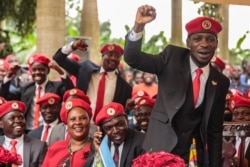Being in the political opposition means speaking out against larger forces; but, in Africa, it can also mean intimidation, arrest and violence. This year, longtime ruling parties clinched presidential victories, again, in Botswana, Mozambique, Namibia, Senegal and South Africa.
WATCH: Anita Powell's video report
Members of opposition parties across the continent say this is not just politics as usual. South African opposition politician Mmusi Maimane says he fears Africa's ruling parties are becoming bolder — and more dangerous.
"The incarcerations that are taking place of opposition leaders, the violence that is taking place is a deep concern," he said in Johannesburg. "We're finding that it cannot be that you live in a continent where the leader of opposition in Tanzania is shot just for standing up for something. It cannot be that when you go to Zimbabwe, that in fact members of parliament from the opposition are being kicked out of their country."
That is something that Uganda's Bobi Wine — a musician-turned-opposition-MP-turned-presidential candidate — knows all too well. He is running for president against one of Africa's most entrenched leaders, Yoweri Museveni, who has been in power since 1986. And it has been a tough road, paved with intimidation, arrests and bans on more than 150 of his concerts.
Wine says he has trouble even talking to voters in his quest to win the 2021 election.
"I cannot be allowed to engage to interact freely with the public," he said during a visit to South Africa to meet with other African opposition leaders. "I'm a member of parliament who cannot be allowed to address his constituents."
The 'liberation' advantage
Maimane says it is a difficult process for the continent to split from the powerful ruling parties that often carried their nations through the hard process of independence from former colonial masters.
"First, you must be liberated — and then soon after that you must liberate yourself from the liberators," he said.
And Wine says he's hopeful — but also cynical — about how that will go for him.
"We believe that we are going to win massively," he said, noting that he felt it was important to launch his campaign two years early to capture the true sentiment of voters. "However, we also suspect that he's going to try to usurp the voice of the people, and my own prediction is that if President Museveni rigs the election right now, the people of Uganda will rise up against him."
Across the continent, opposition parties have complained of an uneven playing field, and of the ruling party using state resources to campaign.
Maimane, who headed the opposition Democratic Alliance until he resigned in October, knows this well. His party took a disappointing 21% in this year's national election, losing to the long-ruling African National Congress. But he says the struggle is bigger than one party, or one country.
"I think what has become true is that institutional politics is being disrupted all over the world," Maimane said. "I think we must realize that the struggle that we're engaged with is generational but not only that it must move beyond politics."







